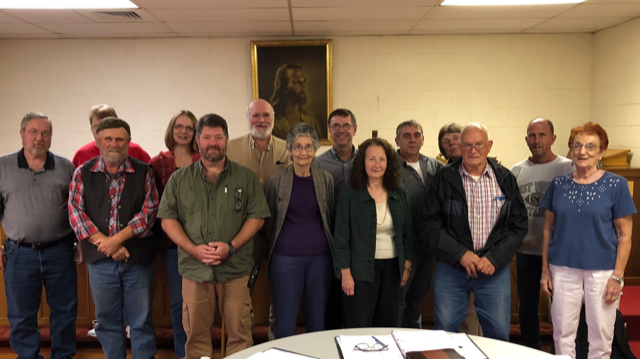
Recently completing Certified Lay Minister training in the Wesleyan District were (L-R): David Bowen, Vicki Bowen, Gary Evans, Penny Gage, Jim Short, Jim Morgan, Mina Luzader, Mike Hinkle, Anita Fouts, Jack Jenkins, Trudy Carowick, John McQuain, Gary Sokol, and Elsie Marie Smith. Not pictured are Josie Tenney and Amy Morrow.
When Jack Jenkins started taking Module 1 of the Certified Lay Minister course of instruction in March of this year, he had no idea what to expect or what the outcome would be. He just knew he had a passion for God and a story that he hoped would inspire others.
After prayerful consideration and the encouragement of his pastor and mentor, Doug Smailes, he enrolled in the first face-to-face series of CLM classes being offered by the Wesleyan District in certified lay ministry and is now temporarily filling in as a part time speaker in Braxton County.
“I was so overwhelmed at the beginning,” Jack said, “but as the classes progressed, I was able to relax, and am so much more confident in writing sermons and preaching, sharing my story.” According to Jack, the face-to-face interactions with other candidates in the District was exactly what he needed; a sentiment echoed by most of the rest of the class.
Elsie Smith has been an assigned supply pastor for two years now, serving in Upshur County, but felt the calling to ministry many years before. “Around 1996, I was helping Bill (her husband) fill the pulpits of a six church charge as a lay speaker, and my first Sunday in the pulpit, facing a congregation of 78 people, I said to myself, “God, what am I doing here?”” Elsie says that God told her that he would show her that she had the gifts she needed to fill the pulpit, and she has used those gifts to minister to others for the past twenty plus years.
“I took the CLM courses because I wanted to keep my churches,’ Elsie said, “but I learned so much that I am happy that I participated.”
Based on recently enacted guidelines in our connection, all Assigned Supply were required to start a CLM program by July 1st of 2018, which meant, at the time, signing up for an online, interactive course.
“The problem was that many of those needing to begin this process served in small churches in rural areas that didn’t have broadband or Internet service, and some struggled with technology issues which didn’t allow for a smooth transition into the coursework,” according to Jim Minutelli, CLM, and instructor for the CLM training program. Others admittedly were hesitant to take more classes on top of their already busy schedules, especially for those who worked a full or part time job away from the pulpit.
“A few were still discerning God’s call in their lives,” Minutelli continues, “and were not serving as an assigned supply or had even written a sermon. This combination of more experienced speakers and those still understanding their place in our connection was a pivotal piece to the success of each and every student and the class as a whole.”
Wesleyan District superintendent Rev. Mary Ellen Finegan puts this all together succinctly: “The movement from being an Assigned Supply serving a local church/charge to becoming a CLM is a wise move,” she said. “The CLMs will have far more training, which will give them a better understanding of the United Methodist Church and how to serve as a pastor, if asked to do so. I also highly recommend the face-to-face classes, which will enable them to work together, learn from one another, and build relationships that will carry them into the future in serving God and the Local Church. The online classes will still be fine for those whose work keeps them from attending local face-to-face modules. Both arenas give them a choice in how to proceed in their CLM training if one does not work for them. I believe the CLM training is an excellent way to prepare those lay persons who feel the call of God upon their lives to be in ministry, but do not feel a call to become ordained or licensed pastors.”
The next step in their certification process, for those willing to serve a congregation or area of ministry, is for each candidate to be recommended by their individual Charge Conferences, then meet with the District Committee on Ministry this December for an interview. These recommendations will then be forwarded to the WV Conference for final approval.
Congratulations to all 16 CLM candidates who completed the four module course of instruction in October!